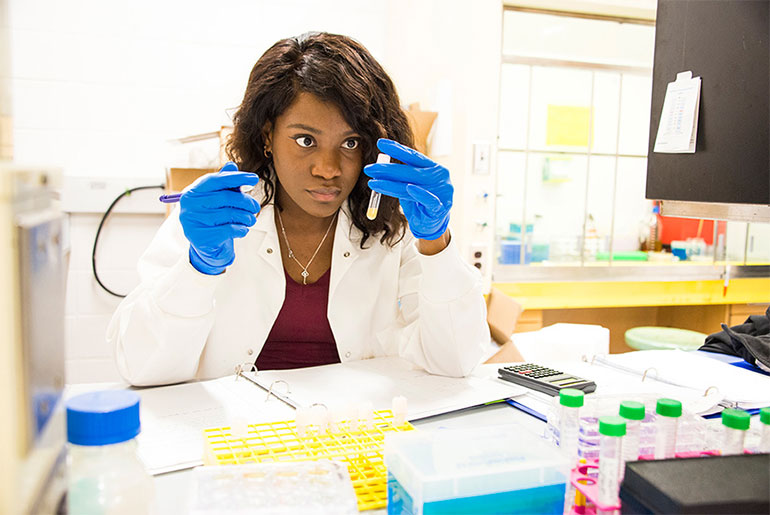The information presented on this page may be dated. It may refer to situations which have changed or people who are no longer affiliated with the university. It is archived as part of Mississippi State University's history.
MSU biochemistry program earns prestigious accreditation
Author: Reagan Poston

Mmesoma I. Okafor, a 2019 summa cum laude biochemistry/pre-medicine graduate from Nigeria, is pictured working in a campus biochemistry lab. MSU has earned prestigious accreditation by the American Society for Biochemistry and Molecular Biology. (Photo by Dominique Belcher)
Mississippi State is the third SEC university and one of only 85 universities nationwide to gain accreditation from the American Society for Biochemistry and Molecular Biology.
Jeffrey Dean, professor and head of MSU's Department of Biochemistry, Molecular Biology, Entomology and Plant Pathology, said the benefits of MSU's accreditation, achieved on the first application, are two-fold.
"First, accreditation provides independent assurance that the curriculum and education offered in this department meet the high standards set by ASBMB, the leading professional society for biochemistry and molecular biology. Second, this designation allows our program's graduating seniors and former graduates to sit for the ASBMB comprehensive accreditation exam. Those who pass it will have a leg-up for admission into competitive research programs and other advanced training opportunities," Dean said.
Dean noted MSU students can take the exam as early as March of this year.
Darrell Sparks, associate professor in the biochemistry, molecular biology, entomology and plant pathology department, said that even students who do not sit for the certification exam will benefit by merely attending an ASBMB-accredited university.
"Studying at a university accredited by the ASBMB or passing the exam are things that employers notice. It makes degree holders more marketable because there's independent assurance of quality for the education they received," Sparks said.
The department offers 11 concentrations in the biochemistry major—five are in pre-medical while six are science-based. Sparks pointed out that students in the science-based concentrations benefit differently from accreditation than students in the pre-medical tracts. While accreditation enhances overall program quality for them, most pre-health majors will have already applied to professional programs before they become eligible to sit for the ASBMB exam.
"The accreditation will prove most beneficial to students who are either going directly into the workforce after graduation or who are going into research-based graduate programs," Sparks said.
Sparks discussed the steps MSU took to earn the designation.
"We gathered a lot of data for the accrediting board, including the qualifications of our faculty, our diversity demographics, the quality of our facilities and equipment, our student-to-faculty ratio and even student-to-equipment ratio. They were looking to ensure that we provide the best possible program for our students, so their focus aligns exactly with our own goals for the degree program," Sparks said.
Beyond providing 11 concentrations for biochemistry majors, from pre-dental, to entomology, to forensic science, Sparks said the department is committed to providing impactful biochemistry training for the widest variety of MSU students.
Current students in the program must complete at least 495 lab hours. The department recently designed a new entry-level lab course for sophomores that will better prepare them for subsequent courses, as well as offer earlier access to biochemistry research experiences. Sparks said proactive changes, like the addition of this new class, were important in achieving accreditation on the first application.
"This accreditation is for six years, after which time we will have to reapply. Maintaining our accreditation will require sustained focus on excellence and continuous improvement. We will constantly review our program to ensure we meet our goals for student success," Sparks said.
The Department of Biochemistry, Molecular Biology, Entomology and Plant Pathology hosts a talented student body, with 63 percent of graduates accepted into medical school, compared to the national average of about 41 percent. The American Association of Medical Colleges, the organization that designs and administers the Medical College Admission Test, or MCAT, identified biochemistry as the discipline most important for mastery of the medical school curricula of the future.
The biochemistry major is offered through MSU's College of Agriculture and Life Sciences. To learn more about the Department of Biochemistry, Molecular Biology, Entomology and Plant Pathology, visit www.biochemistry.msstate.edu.
To learn more about the College of Agriculture and Life Sciences, visit www.cals.msstate.edu.
Date: 2020-02-14
Biochemistry, Molecular Biology, Entomology and Plant Pathology




